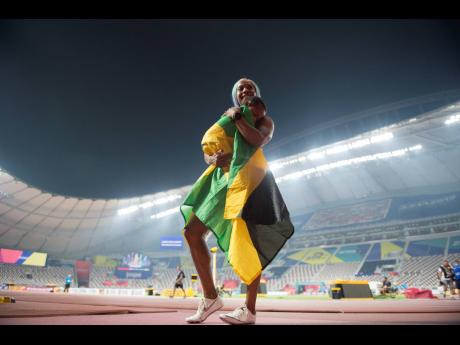Oral Tracey | Our true heroes
The sight of Shelly-Ann Fraser-Pryce with her son Zyon hand draped in the Jamaican national flag celebrating her fourth 100m world title remains indelibly etched in the minds of most, if not all Jamaicans who witnessed it.
Multiply that effect five or tenfold for the number of similar moments provided by the greatest of them all, Usain Bolt, during his illustrious, storied and colourful career, spanning Beijing 2008 to London 2017, there were numerous and epic episodes with Veronica Campbell-Brown, including her dramatic teary-eyed outburst on the gold medal podium at the 2004 Olympics in Athens Greece.
Asafa Powell delivered glorious moments as a two-time 100m world record holder during a period when he reigned supreme as the world’s fastest man. Fast rewind through the reign of the great Merlene Ottey, Donald Quarrie, through to the pioneering efforts of Arthur Wint, Herb McKenley, and George Rhoden.
In boxing, there was Mike ‘The Body Snatcher’ McCallum in boxing. Cricket threw us national legends such as Lawrence ‘Yagga’ Rowe, Michael Holding, and Courtney Walsh. Of more recent vintage, the Reggae Boyz’s historic World Cup qualification in 1998 remains a flagship moment in the lives of most Jamaicans, as did the Reggae Girlz qualifying for this year’s equivalent showpiece.
At almost every period in our history, our sportsmen and women, and our cultural icons, led by the musicians and artists, have wittingly and unwittingly played the roles of inspirers, motivators and heroes for the common Jamaican man, woman, and child. As we celebrate yet another National Heroes Day, it is instructive to note that the last living Jamaican national hero was Sir Alexander Bustamante, who departed this life over 40 years ago in 1977 at 93 years old. Sam Sharpe and Nanny of the Maroons were the most recent to be proclaimed national heroes, as far back as in 1975 and 1976 respectively, roughly four and a half decades ago.
For an entire generation of Jamaicans, the essence of officially celebrating National Heroes Day may very well be losing relevance. With all due respect to the pioneering achievements and tangible contributions to the nation by the likes of Sir Alexander Bustamante, Norman Manley, Nanny of the Maroons, Sam Sharpe, Paul Bogle, George William Gordon, and to a lesser extent Marcus Garvey, they were actually heroes to previous generations of Jamaicans with a diminishing connection to today’s Jamaica.
In the modern and revolutionary thinking of millennials, there is generally a subtle, almost covert, and gradual disregard for history and historical context. There is therefore the clear and present danger of current and future generations manifesting a genuine disconnect from our founding fathers and heroes of the past, as they embrace more contemporary influences.
The effect and reach that the current Jamaican sporting and cultural leaders have had, and continue to have, on the psyche of the average Jamaican is remarkable, not to mention the international impact that these icons continue to have. The Government should ponder a strategic and calculated move to address this widening gulf between the dwindling appreciation of our official heroes and the embrace of the unofficial heroes.
The world is indeed changing; and it is changing fast. The challenge that each older generation faces is keeping pace with, and staying in touch with, the current generation. The tendency of romanticising one era at the expense of another era is literal and real. Truth be told, our heroes will not be our children’s heroes. Our children and their children will embrace and endorse their own heroes. It’s logical that officialdom falls in line and appropriately validate the true heroes of the people.

